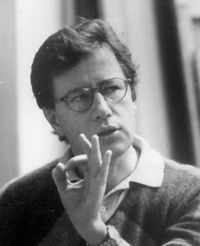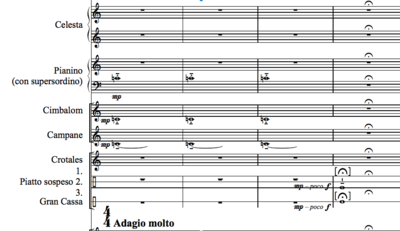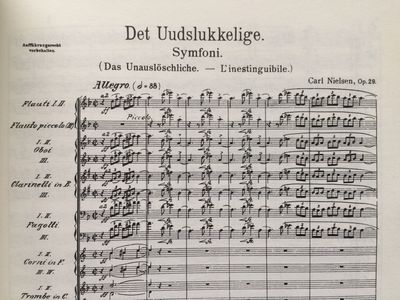Alex Ross's Blog, page 115
August 28, 2015
For Nikolaus Lehnhoff
 The sad news came yesterday of the death, at the age of seventy-six, of the opera director Nikolaus Lehnhoff. Lavishly cultured and innately musical, Lehnhoff occupied a middle ground between traditional and radical approaches to directing opera. Schooled in that inexact science by Wieland Wagner, among others, he seldom slavishly followed indications in the libretto, nor did he impose a soundbite-ready concept; he tailored his ideas to the particular dimensions of the work. I was able to see a fair number of his productions live: Salome at the Met in 1990 and 1996, Palestrina at the Lincoln Center Festival in 1997, the Ring in San Francisco in 1999 (though this was extensively revised by Andrei Serban), Jenůfa at Glyndebourne in 2000 and at the Deutsche Oper in 2002, The Makropulos Case at BAM in 2001 (via Glyndebourne), and Die Gezeichneten in Salzburg in 2005. Each left behind at least one indelible stage image that expressed, with intense clarity, the underlying themes of the opera. I recall a disempowered Herod futilely shouting for Salome's death, with no soldiers in sight; Anja Silja, in Jenůfa, furiously folding towels, in a picture of domestic order turning violent; the stomach-churning sight of the raped and murdered children in Gezeichneten, which seemed to unveil a fundamental horror at the heart of power. Many other Lehnhoff productions can be seen on video, some more successful than others, all bearing insights. (A few years back I wrote about his striking Tosca.) I met him in 2002, when I was staying at the American Academy in Berlin; he was a man of gentle temperament and searching intelligence, his apartment a kind of private museum of German culture. Those who know German can read a warmly discerning obituary by Manuel Brug.
The sad news came yesterday of the death, at the age of seventy-six, of the opera director Nikolaus Lehnhoff. Lavishly cultured and innately musical, Lehnhoff occupied a middle ground between traditional and radical approaches to directing opera. Schooled in that inexact science by Wieland Wagner, among others, he seldom slavishly followed indications in the libretto, nor did he impose a soundbite-ready concept; he tailored his ideas to the particular dimensions of the work. I was able to see a fair number of his productions live: Salome at the Met in 1990 and 1996, Palestrina at the Lincoln Center Festival in 1997, the Ring in San Francisco in 1999 (though this was extensively revised by Andrei Serban), Jenůfa at Glyndebourne in 2000 and at the Deutsche Oper in 2002, The Makropulos Case at BAM in 2001 (via Glyndebourne), and Die Gezeichneten in Salzburg in 2005. Each left behind at least one indelible stage image that expressed, with intense clarity, the underlying themes of the opera. I recall a disempowered Herod futilely shouting for Salome's death, with no soldiers in sight; Anja Silja, in Jenůfa, furiously folding towels, in a picture of domestic order turning violent; the stomach-churning sight of the raped and murdered children in Gezeichneten, which seemed to unveil a fundamental horror at the heart of power. Many other Lehnhoff productions can be seen on video, some more successful than others, all bearing insights. (A few years back I wrote about his striking Tosca.) I met him in 2002, when I was staying at the American Academy in Berlin; he was a man of gentle temperament and searching intelligence, his apartment a kind of private museum of German culture. Those who know German can read a warmly discerning obituary by Manuel Brug.
August 27, 2015
A Copland moment
One of Copland's finest, most richly expressive pieces — why is it not heard more often?
Missing Christopher Keene
August 26, 2015
Kurtág speaks
A perusal score of Kurtág's Petite musique solonnelle en hommage à Pierre Boulez 90, just premiered in Lucerne, can be seen on the Editio Musica Budapest website. The musical world is eagerly awaiting word of Kurtág's Endgame opera, which has been announced several times for the Salzburg Festival and La Scala and then delayed. At the moment, it appears on the La Scala schedule for November 2016; if it has its première in Salzburg next summer, alongside Thomas Adès's The Exterminating Angel, there will be no more interesting place.
Georgia Spiropoulos
The Athens-born composer was featured at this year's ManiFeste festival at IRCAM: her 2010 theatre piece The Bacchae, the opening of which can be seen above, appeared alongside two new pieces, Membranes, for timpani, and Roll... n'Roll... n'Roll, for harp and live electronics, both of which can be heard by following links to the richly stocked IRCAM archive. IRCAM also offers a handsome video of a Philharmonie de Paris concert featuring Michael Jarrell's Assonance VII, Helmut Lachenmann's Mouvement (-vor der Erstarrung), and Boulez's mighty Répons, with the Ensemble Intercontemporain under the direction of Matthias Pintscher.
Essay on Wolff
"Christian Wolff and the Exceptions to the Rule," in a booklet for a Dartmouth celebration of the composer, Oct. 22-24.
August 25, 2015
Noted
Robert Carl: "I’ve come to feel that Feldman was to Cage somewhat as Berg was to Schoenberg—the composer who took a technical and conceptual armature from his mentor and combined it with an ear that was able to render even the most dissonant harmonic materials sensuous. The great surprise is that his music is some of the most beautiful of the second half of the 20th century."
A George Walker moment
Walker, at the age of ninety-three, is now at work on his fifth symphony, Geoff Edgers reports. Ethan Iverson interviewed Walker at length in 2013.
Inextinguishable symphonies
My column in this week's New Yorker, on symphonies of the post-Mahler era, is rooted in old loves. I fell for Mahler and Sibelius as a teenager, and soon began exploring the myriad byways of twentieth-century symphonic writing, often following recommendations in Fanfare magazine. Fanfare led me to, among others, Eduard Tubin, whose symphonies I blasted at high volume throughout my freshman year of college, to the puzzlement of my roommates. At my college radio station, I presented a show called The Twentieth-Century Symphony, which featured not only the obvious Mahler, Sibelius, Nielsen, Shostakovich, Vaughan Williams, and Ives / Harris / Schuman / Copland but also the likes of Bax, Hartmann, Pijper, Vermeulen, Henze, Killmayer, Kelterborn, Bentzon, Holmboe, Valen, Haug, Saeverud, Nørgård, Kokkonen, Sallinen, Nystroem, and Pettersson. Tubin's Sixth was the theme music for my other radio show, Music Since 1900. And my first published piece of music writing, in a WHRB Program Guide from 1988, was a review of the Hyperion CD of Robert Simpson's Sixth and Seventh Symphonies.
There is, to be sure, a great deal more to be said about latter-day symphonic writing than my New Yorker piece could accommodate, and for some months I expect to be receiving letters of the "What about Schreker?" variety. At least twenty or thirty other symphonists* might have been mentioned, in addition to the above-named and those who appear in my column: for example, Hindemith, Schmidt, Wellesz, Honegger, Roussel, Milhaud, Chávez, Villa-Lobos, Casella, Gerhard, Florence Price, Cowell, Sessions, Riegger, Siegmeister, Piston, Thomson, Carter, Harrison, Bernstein, Foss, Antheil, Mennin, Diamond, Creston, Rochberg, Bolcom, Branca, Zwilich, Rangström, Langgaard, Alfvén, Aho, Rautavaara, Szymanowski, Górecki, Lutosławski, Prokofiev, Miaskovsky, Popov, Shebalin, Weinberg, Karamanov, Ustvolskaya, Kancheli, Pärt, Tüür, Narbutaitė, Alwyn, Britten, Arnold, Lloyd, Tippett, Rawsthorne, Frankel, Grace Williams, Davies, Isang Yun, Toshi Ichiyanagi, etc, etc. My ever-patient editors would, however, have balked at publishing an annotated telephone directory. The twentieth-century symphony resists attempts to construct a strict canon; if you love one of these composers, you probably love them all, or, at least, more than a few of them. So few of them stand any chance of being played in today's orchestral culture, which, as Bob Shingleton has often observed on his Overgrown Path blog, runs on a celebrity logic, with a select roster of brand names being used to sell tickets and hundreds of others being thrown by the wayside. Fortunately, recorded archives are vast, and in the digital age can be explored more easily than ever before.
*Note: I'm excluding from the category "symphonists" those who composed just one or two symphonies, no matter how fine (Webern, Korngold, Weill, B. A. Zimmermann, Barber, Walton, William Levi Dawson, Shapero, Fine, Wolpe, Dutilleux, Berio, Gubaidulina, R. Murray Schafer, etc).
Alex Ross's Blog
- Alex Ross's profile
- 425 followers






